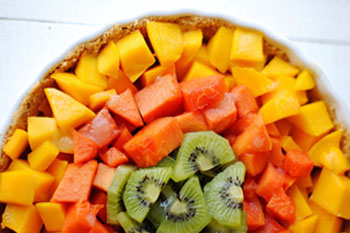
6. Common antioxidant in Kiwi, papaya may |

![]() A new study found that a common antioxidant found in human breast milk and foods like kiwi fruit, papaya, green pepper etc can protect against nonalcoholic fatty liver disease (NAFLD).
A new study found that a common antioxidant found in human breast milk and foods like kiwi fruit, papaya, green pepper etc can protect against nonalcoholic fatty liver disease (NAFLD).
![]() Pyrroloquinoline quinone, or PQQ, is a natural antioxidant found in soil and many foods and enriched in human breast milk," said the study's lead author Karen Jonscher (PhD, an associate professor of anesthesiology and a physicist at CU Anschutz). "When given to obese mouse mothers during pregnancy and lactation, we found it protected their offspring from developing symptoms of liver fat and damage that leads to NAFLD in early adulthood."
Pyrroloquinoline quinone, or PQQ, is a natural antioxidant found in soil and many foods and enriched in human breast milk," said the study's lead author Karen Jonscher (PhD, an associate professor of anesthesiology and a physicist at CU Anschutz). "When given to obese mouse mothers during pregnancy and lactation, we found it protected their offspring from developing symptoms of liver fat and damage that leads to NAFLD in early adulthood."
![]() Scientists have found that mice fed a high fat, Western-style diet gives birth to offspring with a higher chance of getting the disease.
Jonscher and her colleagues fed adult mice healthy diets or Western-style diets heavy on fat, sugar and cholesterol. They gave a subset of both groups PQQ in their drinking water.
Scientists have found that mice fed a high fat, Western-style diet gives birth to offspring with a higher chance of getting the disease.
Jonscher and her colleagues fed adult mice healthy diets or Western-style diets heavy on fat, sugar and cholesterol. They gave a subset of both groups PQQ in their drinking water.
![]() Their offspring were kept on the diets for 20 weeks. Those fed a Western diet gained more weight than those on a healthy diet. PQQ did not change the weight gain but it did reduce the fat in the livers even before the mice were born. The antioxidant also reduced inflammation in the livers of mice fed the Western diet. The researchers found that PQQ protected adult mice from fatty liver, even when it was stopped after three weeks when the mice quit breastfeeding.
Their offspring were kept on the diets for 20 weeks. Those fed a Western diet gained more weight than those on a healthy diet. PQQ did not change the weight gain but it did reduce the fat in the livers even before the mice were born. The antioxidant also reduced inflammation in the livers of mice fed the Western diet. The researchers found that PQQ protected adult mice from fatty liver, even when it was stopped after three weeks when the mice quit breastfeeding.
![]() Jonscher believes the antioxidant may work by impacting pathways critical to the early onset of diseases associated with maternal obesity, high fat diets and inflammation.
Jonscher believes the antioxidant may work by impacting pathways critical to the early onset of diseases associated with maternal obesity, high fat diets and inflammation.
For enquiries info@jothydev.net.
Please visit: jothydev.net | research.jothydev.com | diabscreenkerala.net | jothydev.com/newsletter
